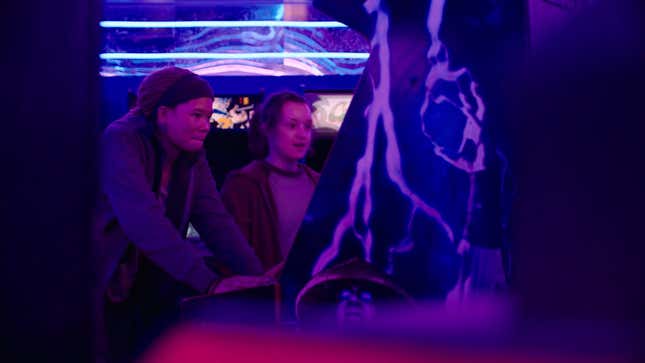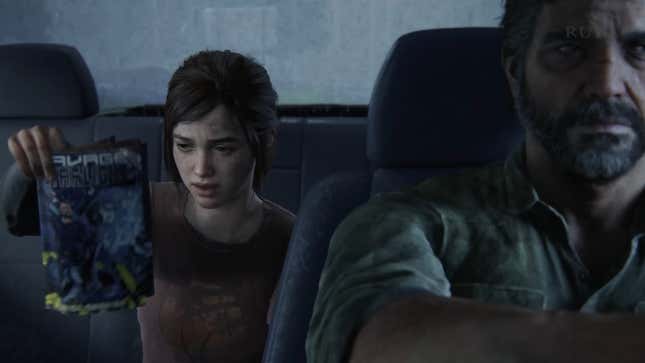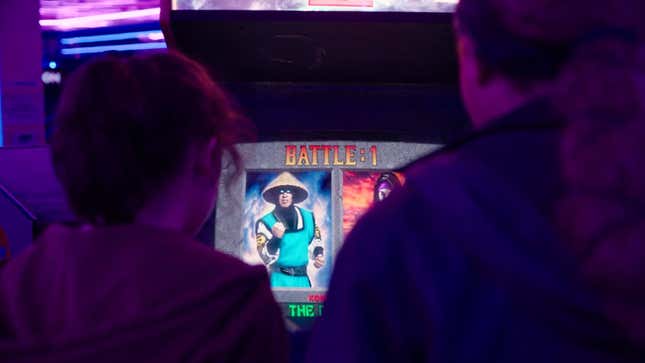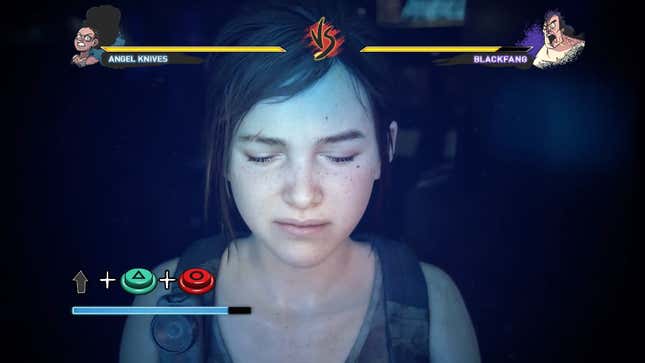
In retrospect, it was pretty clear HBO’s take on The Last of Us was going to do away with one of the source material’s best moments. Back in episode three, Joel and Ellie find a defunct Mortal Kombat II arcade cabinet, prompting the young girl to excitedly tell her grumpy guardian about Mileena’s iconic fatality in which she eats her enemy and barfs out their bones. In the game, it’s a fictional arcade game called The Turning she tells Joel about, and for those of us familiar with the game and its DLC chapter, Left Behind, this served as a pretty strong indication that The Turning’s iconic moment in HBO’s adaptation of that DLC would also be altered. Sure enough, it was. While the sentiment is still fun, the use of Mortal Kombat instead of The Turning both oozes with corporate synergy between PlayStation Productions and Warner Bros. Discovery, and misses a moment of tragic wonder that was a standout segment in the original Left Behind DLC.
The Last of Us’ relationship with in-universe media
The Last of Us games are filled with in-universe media. As Joel and Ellie make their way across Naughty Dog’s version of a post-apocalyptic America, the two frequently stumble upon remnants of the world before the cordyceps fungus destroyed polite society and talk about them in pretty extensive detail. Savage Starlight, a comic series that functions as a collectible in The Last of Us Part I, is a personal favorite of Ellie’s. It’s a science fiction series that follows a character called Dr. Daniela Star who goes on adventures across the galaxy. As you collect these comics throughout the game, you get bits and pieces of the story from the blurbs on the back of each volume, but the real value of them is in the way they expand upon Ellie’s character across both games. She develops a fascination with space and wishes she could have been an astronaut in a world not leveled by an infection, and Dr. Star’s catchphrase of “to the edge of the universe and back, endure and survive” is a thematic touchstone.

At another point, Joel and Ellie find an advertisement for a movie called Dawn of the Wolf that is clearly an homage to the Twilight series, which Joel mentions seeing with his daughter Sarah just before the outbreak. Both Savage Starlight and Dawn of the Wolf make appearances in the show’s seventh episode, which act as both knowing nods to old fans and conversation points about how characters like Ellie and her best friend and first love Riley, who were born after the apocalypse, lack a lot of cultural context for what the world was like before.
However, the show also incorporates a few more real-world brands to illustrate these concepts. During Ellie and Riley’s date in a mall in episode seven, they pass by a Victoria’s Secret and remark about how ridiculous and impractical lingerie seems in a world where they live in military boarding schools and go off to join revolutionary groups like the Fireflies. It’s a fine scene and allows Ellie and Riley a little flirtatious banter as they continue exploring the abandoned shopping center, but it also highlights the reality that TV shows are more likely than games to make product placement deals with real brands, resulting in a divergence from the source material in an episode that mostly plays its adaptation pretty straight (heh).
The show’s got brands on brands on brands
But while the Victoria’s Secret scene is more of a passing moment added into the original Left Behind story, one of the show’s biggest diverging points from the game in this episode occurs when Ellie and Riley go to an arcade on the mall’s top floor. When they arrive, Riley opens a token machine, so the girls can actually play some of these games no one has actually been able to play in decades. This includes Mortal Kombat II, and while Riley schools Ellie pretty hard at first, we see our girl come around and win a match by the end.

In a vacuum, the scene is very cute. We love a comeback story, and Ellie’s clearly a quick study on a fight stick. But in contrast to the original scene in the game, it’s missing something. Because of some key differences in how that scene plays out, it serves as a more poignant case study in how so much of humanity’s culture, art, and tradition has been lost, and how people who were born after the outbreak could only imagine what these things were like.
Left Behind focuses on imagination, the show takes it away
Rather than playing Mortal Kombat II in the game, Ellie and Riley find an unusable arcade cabinet for a fighting game called The Turning. At first Ellie is bummed because she can’t play, but Riley tells her that she still can, she just has to close her eyes and listen to her narration. The camera zooms in on Ellie’s face as she closes her eyes and listens to Riley recount a fight between characters named Angel Knives and Blackfang, with the player doing fighting game inputs that are evocative of real-world fighting games like Street Fighter and, yes, even Mortal Kombat, as it ends with a fatality-style finisher complete with complicated button prompts. As Ellie imagines the fight, light from the game’s screen illuminates her face and we hear what she thinks the scrap would sound like. Despite having not played a video game before, the recreation in her mind, bolstered by Riley’s descriptions, seems pretty accurate. But after Ellie wins the imaginary battle, the two have to come back to the real world where they can’t actually play a round of The Turning.
Left Behind is full of these kinds of moments in which Ellie and Riley are walking through stores in the mall where they’re not quite sure what the practical use was for the merchandise they’re playing with. The show combines two scenes from the game together by having Ellie and Riley dance with game-accurate Halloween masks just before things start to go bad for the pair, but in the game, the girls spend a pretty long stretch picking through a Halloween store and wondering why people were buying masks of creepy clowns and ferocious werewolves. This is a motif throughout the series, of younger characters being left to wonder about what the world before the outbreak was like, only able to imagine what it might’ve been like to live in a place where an infection hadn’t torn everything down around them. That’s why Ellie imagining playing The Turning hits differently than watching her actually play Mortal Kombat.

But even outside of the worldbuilding and thematic color the original scene brings, the use of Mortal Kombat specifically feels like some corporate fuckery that doesn’t sit well with me. Mortal Kombat is a Warner Bros. property, and HBO Max is a streaming service owned by Warner Bros. The next game in the series was unceremoniously announced during an earnings call on Thursday, and now you’ve put the fighting game series in front of millions of people to pique their interest. It’s convenient that The Last of Us would have a scene Warner Bros. could easily make into a bit of product placement, and while it’s a fun reference for much of the audience who will have their own memories of playing Mortal Kombat in an arcade to draw from as they watch Ellie and Riley bond over the game, it does feel like it pushes what made the original arcade scene great to the side for a bit of cheap promotion.
We’re nearly done with The Last of Us’ first season, and while the show’s been pretty consistent in quality, it has been dealing with a lot of back and forth between being true to the source material and having new ideas. Whether changes are big or small, I’ve found myself examining the show through this lens and theorizing about why each change was made. Some feel purposeful, like having what seems to be a Dina cameo in the Jackson segment as a way to plant seeds for season two, or completely reinventing the story of Bill and Frank to more directly lead into questions the show will ask in its finale. Others have felt mean-spirited, like the changes to Tess’ final scene in episode two. But this? It just turns one of Left Behind’s best moments into an ad. At the very least, when Joel attempts to give Ellie a similar experience in a museum in season two, it will probably feel a lot more special to viewers and Ellie alike.

